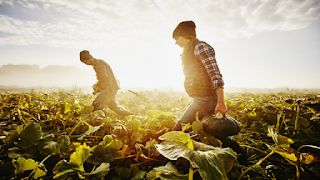A new study has claimed that human urine could provide a cost-effective alternative to synthetic fertilizers, as it contains nitrogen and phosphorus essential for maintaining and promoting crop growth.
Urine nitrogen pollutes Earth's oceans by contributing to excessive algae growth, suffocating coral and poisoning marine life.
Scientists said the average person produces about 132 gallons of urine annually, which can be converted into 5.8 kg of fertiliser.
"Urine is worth its weight in gold," researcher Divina Gracia Rodriguez told ScienceNorway. "Think of all the fertilizer we're missing out on now. It's time to start collecting and using our waste."
The research team is developing toilets that can separate urine from remaining water, and have already begun testing them in the Dar Bahr, Ethiopia.
Once separated, urine can be dried and turned into odorless, inexpensive pellets, which can be spread across farmland to fertilize crops.
Anne Sporkland, a professor and medical researcher at the Norwegian University of Oslo, said: “This method can be applied at home by mixing one small part of urine with an appropriately large amount of water, and spraying the liquid on vegetables. Soil bacteria then convert the nitrogen into new building blocks for plants to use.” ".
While the idea may seem strange, University of Michigan scientists confirmed in a 2020 study that urine fertilizer can be used without fear of spreading antibiotic-resistant infections.
At the time, study co-author Dr Christa Wigginton said: “Humans have been collecting urine and using it as fertilizer for a very long time, but then that stopped in the West with the invention of the sewage system. We are trying to understand how we can step back and think differently about What goes into this sewage system, and the recovery of some valuable waste.”
Tags:
dar bahr
ethiopia
growing vegetables
human urine
nitrogen
phosphorus
poisoning marine life
science
strange idea
synthetic fertilizers






Great
ReplyDeleteGud
ReplyDeleteSuper
ReplyDeleteGood
ReplyDeleteYes human wastes are good fertilizer
ReplyDeleteGood
ReplyDeleteGood
ReplyDeleteGood
ReplyDeleteGood
ReplyDeleteRjfhfjfj
ReplyDeleteRu
ReplyDeleteGood
ReplyDeleteGood
ReplyDeleteBest
ReplyDeleteBetter
ReplyDeleteBetter
ReplyDeleteBest
ReplyDeleteGood
ReplyDeleteSuperb
ReplyDeleteGood
ReplyDeleteGood
ReplyDeleteGood
ReplyDeleteGood
ReplyDeleteGood
ReplyDeleteSuper
ReplyDeleteSuperb
ReplyDeleteBest
ReplyDeleteGood
ReplyDeleteGood
ReplyDeleteGood
ReplyDeleteGood
ReplyDeleteGood
ReplyDeleteGood
ReplyDeleteBest
ReplyDeleteBest
ReplyDeleteGood
ReplyDeleteGood
ReplyDeleteGood
ReplyDeleteGood
ReplyDeleteGood
ReplyDeleteGood
ReplyDeleteGood
ReplyDeleteGood
ReplyDeleteGood
ReplyDeleteAmazing
ReplyDeleteHilarious.
ReplyDeleteStrange
ReplyDelete